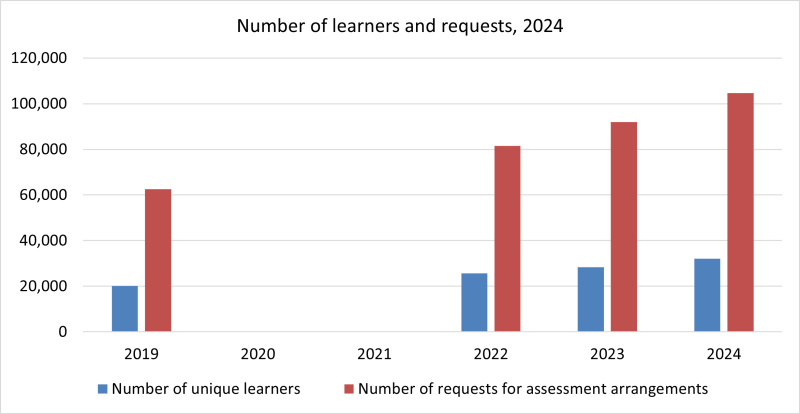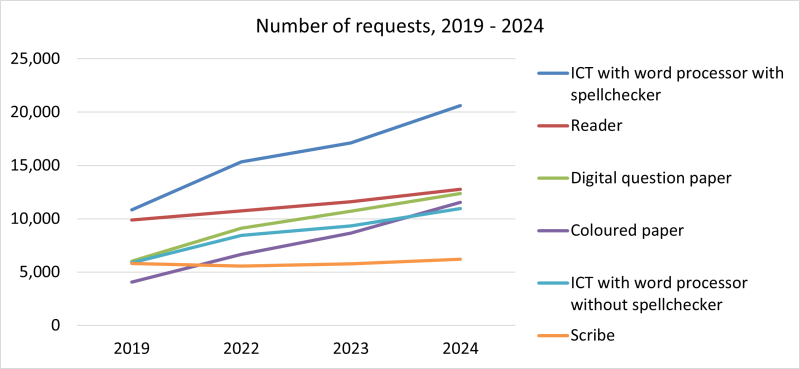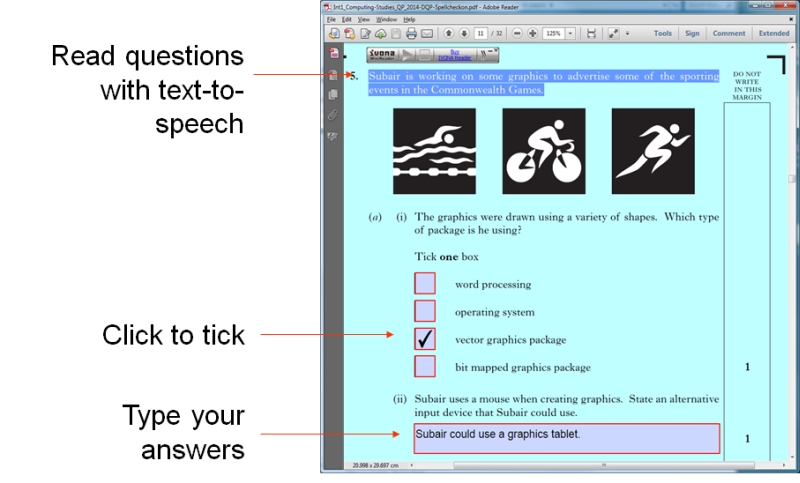 Newsletter: join thousands of other people
Newsletter: join thousands of other people
Once a month we'll send you an email with news, research and thoughts, as well as training courses and free webinars you may wish to attend.
Posted by Paul Nisbet on the 9th August, 2024

SQA have published information about Assessment Arrangements in the 2024 examinations last term. The figures provide a snapshot of the type of support that pupils used in examinations this year, and by implication, in the classroom. The figures show that technology and digital papers are becoming more commonly used compared to readers and scribes.
While digital assessment arrangements are becoming more popular, there are some new opportunities for candidates to use technology for assessment arrangements in 2024-2025:
With this in mind, CALL will be organising some events with SQA and suppliers this term, and for people who want more in-depth, systematic professional learning, we are launching a new 4 week online course that starts on August 29th. If you'd like to find out more about the use of technology and digital assessment arrangements, please find out more and sign up for the course.

However, although digital assessment arrangements are becoming more popular, we know that there are still limitations - for example, few candidates are able to use the iPads or Chromebooks that they use in class in examinations; management of digital technology is time-consuming and does not utilise features of modern digital learning; and the SQA digital papers are not accessible for every learner.
Last year colleagues in several schools and local authorities explored several online assessment tools such as exam.net, OrbitNote and Trelson Assessment, and this session we hope to build on this work and again work with the technology providers and colleagues to implement the use of these tools for assessment arrangements in 2024-2025.
Assessment arrangements (AA) are intended to allow "candidates who are disabled, and/or have been identified as having additional support needs, access to appropriate arrangements to complete the assessment without compromising its integrity". The type of support that can be requested can include, for example, extra time, separate accommodation, reader or scribe, the question paper in a different font or format, and use of a word processor.
SQA have published information about the 2024 assessment arrangements which shows that the number of pupils for whom AA were requested, and the number of requests, continues to rise - the number of learners increased by 13% to 32,030 and the number of requests by 13.9% to 104,695, compared to 2023. This is a slightly higher rate of increase compared to 2022 to 2023 (10% and 12.75% respectively).

The number of requests for use of ICT (i.e. any device and word processor) and for digital question papers (DQPs) has continued to increase. Extra time and separate accommodation are still the most common type of arrangements, followed by use of technology.
The graph below show the changes in number of requests for the five most popular types of support (excluding extra time and separate accommodation).
The number of requests for all these methods of support have risen, as we might expect given the 13.9% increase in the total number of requests for AA.

This graph below shows the percentage of requests which included the different methods of support, which is useful for comparing trends with assessment arrangements.
The use of ICT continues to be more commonly used compared with previous years, while readers and scribes are less commonly requested.

There were 44,270 requests for ICT or digital papers in 2024 compared to 6,215 for scribes and proportionally, requests for scribes are becoming fewer over time.
Use of ICT with spellcheck (20,615 requests) is almost twice as popular as ICT without spellcheck (11,555), indicating the importance of spellchecking for pupils with additional support needs.
There were 12,780 requests for human readers (12.2% of the total) and 12,385 requests for digital question papers (11.8%) so the gap between requests for digital question papers and readers is narrowing. Although many pupils use digital papers and text-to-speech as an alternative to readers, we cannot compare the two directly because many pupils use DQPs without text-to-speech - but this trend is encouraging because our hope is that more pupils will have the opportunity to access examinations independently and to rely less on human readers.
We also know that the number of requests do not represent the number of actual examinations where AA were used: for example, we know that staff sometimes request to use a human reader as a back-up in case of problems with technology.
Requests for coloured paper have increased quite sharply since 2022 when examinations re-started following the pandemic years: from 6,665 requests in 2022 to 11,555 - a 73% increase. In 2022, 8.2% requests for AA included colour paper, rising to 11% in 2024.
This is an interesting trend - it may indicate greater awareness of the impact of coloured resources for pupils with visual impairment, CVI or dyslexia. Of course, the page colour of digital question papers can be easily changed, but coloured hard copy papers are probably easier to manage and administer compared to organising ICT. The popularity of coloured papers does emphasise the importance of colour as an accessibility feature for examinations, assessments and learning resources.


4-week short study online course

Once a month we'll send you an email with news, research and thoughts, as well as training courses and free webinars you may wish to attend.
Our social media sites - YouTube, Twitter and Facebook